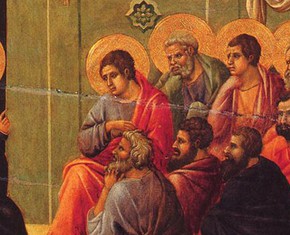The views expressed in our content reflect individual perspectives and do not represent the authoritative views of the Baha'i Faith.
My wife took me out to dinner for Valentine’s Day, and we got into a big discussion: what’s the difference between Baha’is and Unitarians?
We went to a nice restaurant (South American food—yum), and while the hostess tried to find us a table, two close friends walked in—who we hadn’t expected to see. My wife Teresa and I are both Baha’is and our friend Don is a retired Methodist minister. His wife Peggy has gone to Quaker services for many years. They’re both very well-known in our town, because Don and Peggy have beautiful hearts—they volunteer in many worthwhile social causes, work to protect the Earth and usually have beaming smiles on their faces. They’re the friendliest, warmest people you can imagine.
We love Don and Peggy, so Teresa and I simultaneously had the good idea to share our Valentine’s Day dinner with them. That worked out nicely, since the hostess only had a table for four, anyway. We sat down, ordered our meals and started to have an intense conversation about religion. I mean, like true religion, Valentine’s Day is all about love, right?

Historic Unitarian Arlington Street Church in Boston, MA
It began like this: Don told us about a recent experience, when he was asked to help give the Sunday service at the local Unitarian-Universalist church. The Unitarians have a relatively new Reverend, who moved to the community a while ago, and who asked Don to co-present one Sunday. Don said he really enjoyed the experience, and had a great time meeting the congregation. We all agreed that we liked and respected all the Unitarians we knew, and Teresa said she even attended a Unitarian church for a while before learning about the Baha’i teachings and becoming a Baha’i.
Then Don asked us a seemingly simple question: “What’s the difference between Unitarians and Baha’is?”
When you’re talking to Don, you never know if his questions have more than one level of meaning or intent—he’s a bright, well-educated and inquisitive guy, with a constant twinkle in his eye. When he asks a question about religion, you know it’s an informed one. After all, he spent four years in a rigorous seminary program training for the ministry; and then spent forty years studying scripture, preaching about it and answering people’s questions regarding their innermost beliefs. Don stays very current on the issues of the day, and knows what he’s talking about. I wondered, when he asked the question, whether he already had an answer in mind. I figured he must.
I said “Well, the Unitarians and the Baha’is actually have a lot in common.” “Let’s make a list,” someone suggested. So we did:
- Both Unitarians and Baha’is believe in an independent search for truth:
- We believe in the never-ending search for truth. If the mind and heart are truly free and open, the revelations that appear to the human spirit are infinitely numerous, eternally fruitful, and wondrously exciting. – What Do Unitarian Universalists Believe, by David O. Rankin, p. 2.
- No man should follow blindly his ancestors and forefathers. Nay, each must see with his own eyes, hear with his own ears and investigate independently in order that he may find the truth. The religion of forefathers and ancestors is based upon blind imitation. Man should investigate reality. – Abdu’l-Baha, Divine Philosophy, p. 25.
- Both Unitarians and Baha’is believe in the freedom of expression:
- We believe in the freedom of religious expression. All individuals should be encouraged… to present openly their religious opinions without fear of censure or reprisal. – Rankin, p. 2.
- Let us also remember that at the very root of the Cause lies the principle of the undoubted right of the individual to self-expression, his freedom to declare his conscience and set forth his views. – Shoghi Effendi, Baha’i Administration, pp. 63-64.
- Both Unitarians and Baha’is believe in love:
- We believe in the motive force of love. The governing principle in human relationships is the principle of love, which always seeks the welfare of others and never seeks to hurt or destroy. – Rankin, p. 4.
- Reality is love, ever working for the welfare of humanity. Reality is the bond which conjoins hearts. This ever uplifts man toward higher stages of progress and attainment. – Abdu’l-Baha, The Promulgation of Universal Peace, p. 375.
- Both Unitarians and Baha’is believe in the essential goodness and harmony of all Faiths:
- We believe in the toleration of religious ideas. All religions, in every age and culture, possess not only intrinsic merit, but also potential value for those who have learned the art of listening. – Rankin, p. 2.
- From the days of Adam until today, the religions of God have been made manifest, one following the other, and each one of them fulfilled its due function, revived mankind, and provided education and enlightenment … The religion of God is one religion, but it must ever be renewed. – Abdu’l-Baha, Selections from the Writings of Abdu’l-Baha, pp. 51-52.
“Well,” Peggy said, “it sounds like Unitarians and Baha’is do have a lot in common. In fact, they sound very similar.”
“Wait a minute,” Don said. “We’re missing a very important point of departure here. Sure, Unitarians and Baha’is do have a great deal in common, but what’s their main difference?”
Obviously, this was going to take some serious thought. In the next essay in this series, we’ll see if we can start to answer Don’s penetrating question.
















Comments
Sign in or create an account
Continue with Googleor